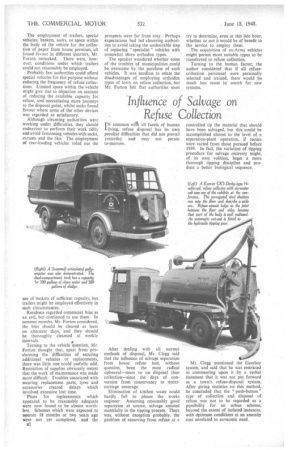influence of Salvage on Refuse Collection
Page 36

If you've noticed an error in this article please click here to report it so we can fix it.
use of baskets of sufficient capacity, but trailers might be employed effectively in such circumstances.
Residents regarded communal bins as an evil, but continued to use them. In summer months, Mr. Forton considered, the bins should be cleared at least on alternate days, and they should be thoroughly cleansed at weekly intervals.
Turning to the vehicle question, Mr. Forton thought that, apart from proclaiming the difficulties of securing additional vehicles or replacements, there was little one could usefully add. Restriction of supplies obviously meant that the work of maintenance was made more difficult. Troubles associated with securing replacement parts, tyres and accessories created delays which involved excessive lost time.
Plans for replacements which appeared to be reasonably adequate were now found to be almost worthless. Schemes which were expected to operate 18 months or two years ago were not yet completed, and the B2 After dealing with all normal methods of disposal, Mr. Clegg said that the influence of salvage separation from house refuse had, without question, been the most radical upheaval—more so on disposal than collection—since the days of conversion from conservancy to watercarriage sewerage.
Elimination of kitchen waste could hardly fail to please the works engineer Assuming reasonably good separation at source, salvage assisted materially in the tipping process. There was, without exception probably, the probilem of removing from refuse at a Mr. Clegg mentioned the Garchey system, and said that he was restricted in commenting upon it by a verbal statement that it was not put forward as a town's refuse-disposal system. After giving statistics on this method, he concluded that the " push-button " type of collection and disposal of refuse was not to be regarded as a possibility for an urban scheme, beyond the extent of isolated instances, with optimum conditions at an amenity cost unrelated to economic need.




















































































